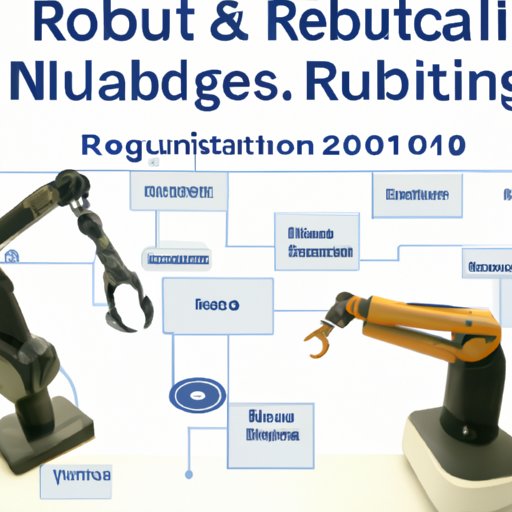Introduction
Robotics engineering is an ever-evolving field that combines elements of electrical engineering, mechanical engineering, and computer science. The goal of robotics engineering is to design, build, test, and maintain robots in an effort to increase efficiency and accuracy in manufacturing processes. There are many different fields within robotics engineering, each requiring its own set of skills and knowledge.
This article will explore the major topics needed to become a robotics engineer, analyze the types of robotics degrees available, explain the skills required to succeed in the field, and highlight the benefits of pursuing a career in robotics engineering.
Examining the Different Fields of Robotics Engineering
Robotics engineering can be divided into two main fields: hardware and software. Hardware engineers focus on designing, building, and testing robots, while software engineers develop the algorithms and software used to control these robots. Both fields require a strong understanding of electronics, computer science, and mechanical engineering.
There are several different types of robotics degrees available, including associate’s, bachelor’s, master’s, and doctoral degrees. An associate’s degree typically takes around two years to complete and provides students with a basic introduction to robotics engineering. A bachelor’s degree offers more in-depth training and can take anywhere from three to five years to complete. Master’s and doctoral degrees are more specialized and involve more research and hands-on experience.

Exploring the Major Topics Needed to Become a Robotics Engineer
In order to become a successful robotics engineer, there are certain topics that must be studied and mastered. These include control systems, electronics, computer science, mechanical engineering, mathematics, artificial intelligence, and sensor technology.
Control Systems – Control systems are the backbone of robotic engineering. They are responsible for controlling the movement and behavior of robots. Control systems rely on feedback loops and sensors to monitor the environment and make decisions about how to act.
Electronics – Electronics is a critical component of robotics engineering. It is used to design and build the electronic components that power robots and enable them to interact with their environment. This includes microcontrollers, sensors, actuators, and other electronic components.
Computer Science – Computer science is essential for creating the software that controls robots. This includes writing code that allows robots to understand commands and interact with their environment. It also involves developing algorithms and artificial intelligence (AI) systems that enable robots to learn and adapt.
Mechanical Engineering – Mechanical engineering is the study of the design and construction of machines. In robotics engineering, mechanical engineering is used to create the physical structure of robots and their components. This includes the use of materials such as metals, plastics, composites, and ceramics.
Mathematics – Mathematics is an important part of robotics engineering. It is used to calculate the motion of robots, develop algorithms for controlling robots, and design sensors and actuators. It is also used to analyze data collected by robots and develop models for predicting the behavior of robots.
Artificial Intelligence – Artificial intelligence (AI) is becoming increasingly important in robotics engineering. AI is used to create robots that can learn from their environment and make decisions on their own. AI systems are also used to develop algorithms that enable robots to navigate their environment and interact with humans.
Sensor Technology – Sensor technology is used to collect data from the environment and transmit it to the robot. This data is then used to guide the robot’s movements and inform its decisions. Sensor technology can range from simple infrared sensors to complex 3D cameras.

Analyzing the Types of Robotics Degrees Available
As mentioned earlier, there are several different types of robotics degrees available. Each type of degree has its own set of requirements and focuses on different aspects of robotics engineering.
Associate’s Degree – An associate’s degree in robotics engineering is typically a two-year program that focuses on the basics of robotics engineering. Students learn about electronics, control systems, and computer programming. They also gain hands-on experience building and programming robots.
Bachelor’s Degree – A bachelor’s degree in robotics engineering typically takes three to five years to complete and provides students with a more in-depth look at the field. Students learn about control systems, electronics, computer science, and mechanical engineering. They also gain experience with robotics hardware and software.
Master’s Degree – A master’s degree in robotics engineering is more specialized and takes two to three years to complete. Students learn about advanced topics such as robotics hardware, software, and AI systems. They also gain experience with research and development.
Doctoral Degree – A doctoral degree in robotics engineering is the most advanced degree available. It typically takes four to six years to complete and focuses on research and development. Students learn about the latest advancements in robotics engineering and gain experience with cutting-edge technologies.
Explaining the Skills Required to Succeed in Robotics Engineering
Robotics engineering requires a variety of skills in order to be successful. These include problem-solving skills, programming skills, knowledge of robotics hardware and software, and interpersonal skills.
Problem-Solving Skills – Problem-solving skills are essential for robots engineers. They must be able to identify problems, analyze data, and come up with creative solutions. They must also be able to think critically and work collaboratively with others.
Programming Skills – Programming skills are another important skill for robotics engineers. They must be able to write code that enables robots to perform tasks and interact with their environment. Knowledge of programming languages such as C++, Python, and Java is essential.
Knowledge of Robotics Hardware – Robotics engineers must have a thorough understanding of robotics hardware such as motors, servos, sensors, and actuators. They must be able to design and build these components and ensure they are functioning properly.
Knowledge of Robotics Software – Robotics engineers must also have a good understanding of robotics software such as control systems, AI systems, and simulation software. They must be able to write code that enables robots to interact with their environment and make decisions.
Interpersonal Skills – Interpersonal skills are important for robotics engineers. They must be able to collaborate with other engineers, communicate effectively with customers, and manage projects efficiently. They must also be able to work well under pressure and handle challenging tasks.

Highlighting the Benefits of Pursuing a Career in Robotics Engineering
Robotics engineering is a rapidly growing field with a wide variety of job opportunities and a high salary potential. It is also a highly rewarding field that allows engineers to work on exciting projects and solve complex problems.
Job Growth – The demand for robotics engineers is expected to grow significantly over the next decade. Jobs in this field are expected to increase by 12% by 2028, far outpacing the average for all occupations.
Salary Potential – Robotics engineers are among the highest paid engineers. According to the Bureau of Labor Statistics, the median salary for robotics engineers is $87,000 per year. With experience and additional education, salaries can reach upwards of $150,000 per year.
Variety of Careers – Robotics engineering is a diverse field that offers a wide variety of career paths. Engineers can specialize in a specific area such as control systems, sensor technology, or artificial intelligence. They can also work in a variety of industries such as automotive, aerospace, healthcare, and manufacturing.
Conclusion
Robotics engineering is an exciting and rapidly growing field that offers a wide variety of career opportunities. To become a successful robotics engineer, one must have a strong understanding of control systems, electronics, computer science, mechanical engineering, mathematics, artificial intelligence, and sensor technology. There are several different types of robotics degrees available, and the skills required to succeed in the field include problem-solving skills, programming skills, knowledge of robotics hardware and software, and interpersonal skills. Additionally, the job growth and salary potential in robotics engineering are very attractive, making it an appealing career path for those interested in technology.
(Note: Is this article not meeting your expectations? Do you have knowledge or insights to share? Unlock new opportunities and expand your reach by joining our authors team. Click Registration to join us and share your expertise with our readers.)
